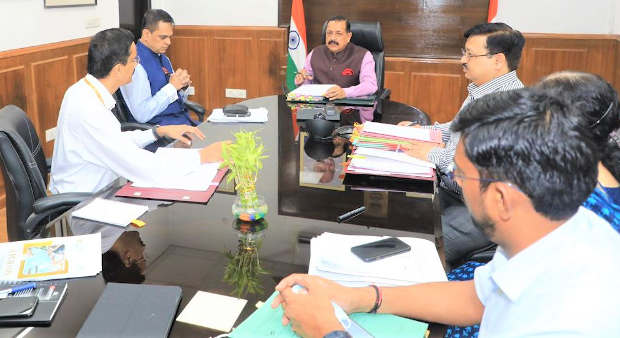Modi Govt Plans to Improve the Online CPGRAMS Facility for Citizens

The Union Minister of State for Science & Technology and Earth Sciences (I/C), Prime Minister’s Office, Personnel, Public Grievances & Pensions, Atomic Energy and Space, Dr. Jitendra Singh reviewing the status of public grievance redressal, in New Delhi on July 31, 2022. Photo: PIB
Dr Jitendra Singh – a minister in the prime minister office (PMO) – has said that significant improvements will be brought to the Centralized Public Grievance Redress and Monitoring System (CPGRAMS) of the Government of India.
The minister said on July 31 that the timeline limit for redressal of public grievances has been reduced from 45 days to 30 days.
He said the decision has been taken with the advice from PM Narendra Modi who expects an effective implementation of public grievance redressal mechanism with disposal of grievance within minimum possible time, but with maximum possible satisfaction of the complainant.
The minister added that a notification issued by the Department of Administrative Reforms and Public Grievance (DARPG) also states that a complaint received from a citizen will not be closed until an appeal filed against it is disposed of.
Dr Jitendra Singh said the latest order mandates that the grievances received on CPGRAMS shall be resolved promptly as soon as they are received but within a maximum period of 30 days.
In case the redress is not possible within the prescribed time-frame due to the circumstances such as sub judice matters, policy issues, etc., an interim / appropriate reply shall be given to the citizen.
While at present the CPGRAMS is a flawed and defunct website, Dr Jitendra Singh informed that CPGRAMS 7.0 has enabled auto-routing of grievances to last mile grievance officers, along with improved data analytics using digital dashboards.
In its latest order, the DARPG has asked all departments to appoint nodal grievance resolution officers (GROs) and to empower them adequately to resolve public complaints.
They may appoint as many GROs as deemed necessary based on the number of public grievances received under the overall supervision of the nodal grievance resolution officer.
After closure of a grievance, citizens have the option to submit their feedback and file an appeal. To obtain the feedback on the quality of grievance disposed, an outbound call centre has been started. All citizens will be contacted by the call centre to obtain feedback.
The order states that citizens will be provided the option to file an appeal if they are not satisfied with the grievance disposed of. The feedback received from citizens by the call centre will be shared with ministries or departments who would be responsible to deal with the feedback and to make systemic improvements.
To institutionalize the mechanism of grievance resolution and to ensure quality disposal, the secretary of the ministry / department may review the disposal process in senior officers meetings, the DARPG said.
Apart from this, the ministries / departments may also monitor complaints which may be raised in print, electronic, and social media.













